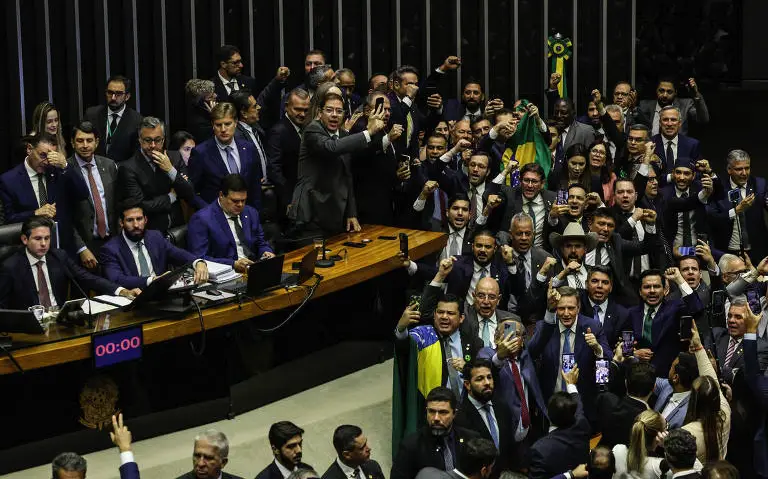The trial of former president Jair Bolsonaro and his accomplices for the attempted coup d’état aimed at preventing Lula’s inauguration in 2022 has reopened in Brazil the debate on the possibility of granting amnesty to those involved in this attempt to overturn the democratic order. After being sentenced to prison by the Supreme Court, an amnesty law approved by Parliament would be their last hope to avoid jail.
What is surprising is the ease with which some defend this possibility, as if granting amnesty—that is, reviewing judicial sentences—were a common attribution of the legislative branch. This stance not only distorts the spirit of amnesty laws as instruments of reconciliation but also undermines the logic of the rule of law.
Historically, amnesty has been legitimately used in transitions toward democracy or in pacification processes after internal conflicts. Although they do not definitively close wounds, they are often conceived as tools for national reconciliation and the beginning of a new political stage. Outside these exceptional contexts, amnesty becomes a mechanism for politicians in power to forgive the crimes of their allies, violating constitutional principles such as the separation of powers, normative hierarchy, and the prohibition of arbitrariness.
In general terms, amnesty implies the pardon of politicians, militants, activists, and authorities for crimes arising from their political actions. These crimes usually occur in civil wars, armed conflicts, or dictatorial regimes, both by those seeking to subvert the order and those defending it. In these cases, amnesty is part of transitional justice. Its goal is to open a new cycle of reconciliation and institutional strengthening to prevent future human rights violations.
In this framework, amnesty laws become milestones of new constituent processes. There is no contradiction between their incorporation into the legal order and the pardon of political crimes, even violent ones. As they are approved in moments of legal redefinition, the only limit is the legitimacy of the process, a diffuse concept but linked to social consensus on its benefits. That is why amnesty cannot benefit only one side: it must include both opponents and state agents and defenders of the previous regime.
A paradigmatic example was the South African Amnesty Law of 1995, which created the Truth and Reconciliation Commission. It investigated crimes of both apartheid and the liberation movements and preceded the definitive Constitution of 1996.
In other cases, amnesty is granted without a constitutional rupture but with the aim of ending armed conflicts that weaken the rule of law. In these processes, legitimacy is guaranteed through the control exercised by the supreme interpreter of the constitution. This allows for innovative formulas, such as the Special Jurisdiction for Peace in Colombia, created to end the conflict with the FARC and supervised by the Constitutional Court. The objective was to balance respect for the law with the needs of transitional justice.
These two models show that amnesty, as an exceptional measure, requires broad legitimacy to be seen as a higher good and not as an arbitrary decision in favor of a political group. A contrary example was the Full Stop Law (1986) and Due Obedience Law (1987) in Argentina, which protected military officers responsible for crimes during the dictatorship. Although not amnesty in the strict sense—as they limited the future possibility of prosecuting repressors—they neither included judicial recognition of the crimes nor requests for forgiveness or intent to make amends.
Both laws were repealed in 2003 and declared unconstitutional in 2005 by the Argentine Supreme Court. This reinforces the idea that, without social consensus, pardoning political crimes is an arbitrary act that does not fit within the rule of law.
Similarly, the proposal to amnesty the 2022 coup attempt, defended by Bolsonarism, would mean impunity for a specific political group, taking advantage of a possible parliamentary majority. This offers Brazilian society neither repentance, nor acknowledgment of the harm caused, nor any real solution to any conflict—since the only potential one would have been triggered if the coup had succeeded.
This lack of legitimacy also parallels the recent Amnesty Law promoted by Pedro Sánchez’s government in Spain, which benefited Catalan independence leaders after the attempted secession of 2017. That process was judged by the Supreme Court as an attempt to violently suppress the rule of law in part of the national territory, and those responsible were sentenced to prison. Initially, the Spanish government rejected the amnesty, considering it unconstitutional. However, after the tight 2023 elections, the measure was accepted as a bargaining chip to secure the president’s investiture. In other words, in a consolidated democracy, without circumstances justifying a transitional justice process or armed conflict, and affecting only one political group, amnesty was used as a tool of parliamentary negotiation. This sheds light on Bolsonarism’s intentions: as in Spain, the aim is to exploit a legislative majority to annul a judicial ruling and erase the crimes of those who tried to overthrow the democratic regime by violent means.
Although constitutional interpretations of amnesty in the rule of law may vary, one principle admits no nuance: without clear limits, these laws can become instruments of impunity that erode the foundations of democracy. When a democratic regime has activated its institutional mechanisms—such as judicial control over those who attempt to subvert the constitutional order—there is no legitimate space for laws that erase those crimes. Allowing the legislative branch to undo what the judiciary has sanctioned opens the door to decisionism, where the law is bent to the particular interest of temporary political majorities. If so, unchecked power would run rampant, and we would be closer to the rule of men than to the rule of laws.
*Machine translation, proofread by Ricardo Aceves.














